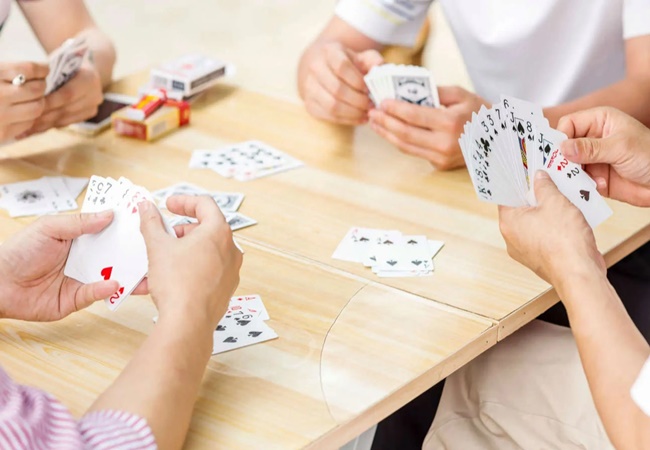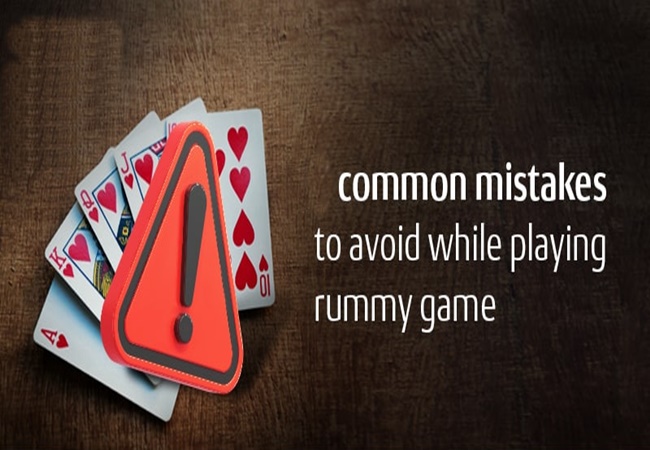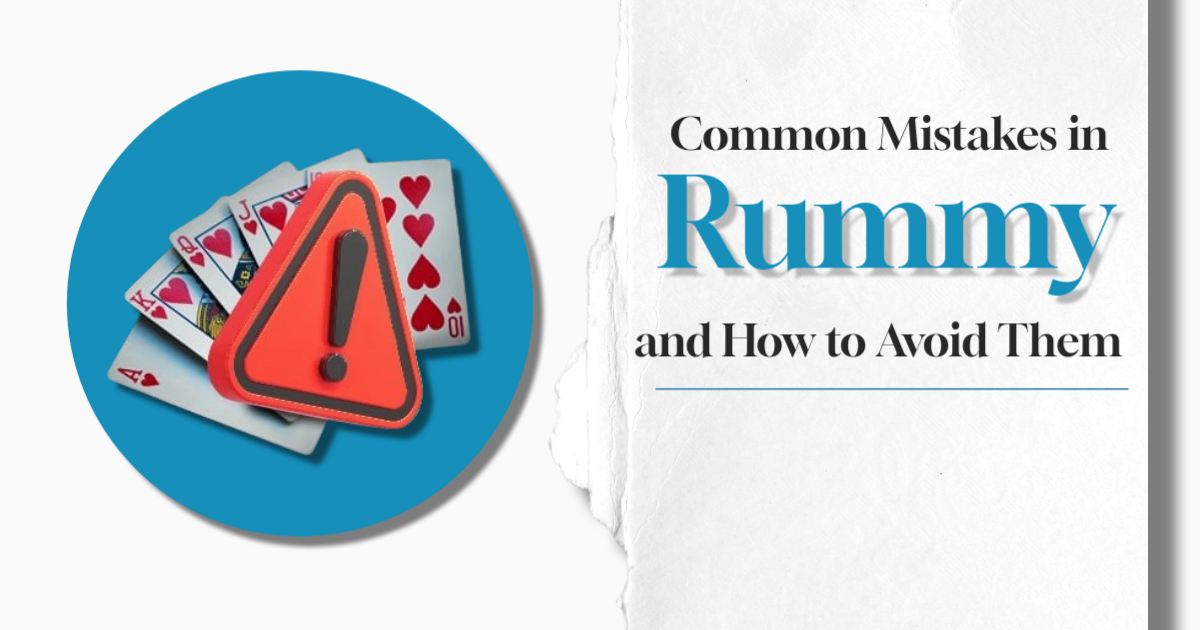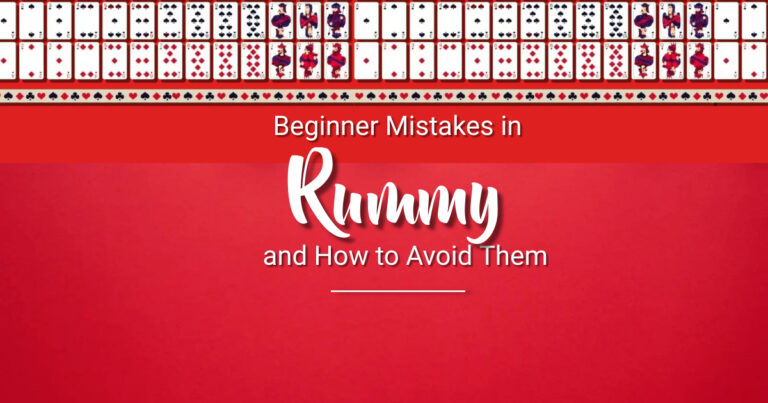Common Mistakes in Rummy and How to Avoid Them
Rummy is one of the most beloved card games, known for its mix of strategy, skill, and luck. While the rules are straightforward, mastering the game can be tricky, especially for beginners. Even experienced players often fall into common traps that can cost them the game. Whether you’re new to rummy or looking to refine your skills, understanding these mistakes and learning how to avoid them is essential for improving your performance. Here’s a detailed breakdown of the most common mistakes in Rummy games and tips on how to avoid them.

1. Not Prioritizing Pure Sequences
A pure sequence in rummy consists of three or more consecutive cards from the same suit, without the use of jokers. One of the key rules in rummy is that you cannot declare a win without at least one pure sequence. Many players, especially beginners, make the mistake of delaying the creation of this sequence, focusing instead on forming sets or impure sequences, often influenced by the strategies of Teen Patti stars (sequences that use jokers).
How to Avoid It:
Start building a pure sequence as early as possible. A good strategy is to first focus on forming your pure sequence before anything else to avoid common mistakes in rummy. This way, even if the game is interrupted or your opponent declares early, you’re not caught unprepared with an invalid hand.
2. Holding on to High-Value Cards for Too Long
In rummy, face cards such as Kings, Queens, Jacks, and Aces carry a high penalty if they remain in your hand when an opponent declares. Holding on to these cards in the hopes of forming a sequence or set can be risky, especially if the game moves quickly and you don’t get the right cards to form combinations, leading to potential mistakes in rummy.
How to Avoid It:
It’s important to discard high-value cards that aren’t part of a sequence or set early in the game. If you’re holding on to a King or Queen, for instance, and the game is nearing its end, the penalty for these cards could cost you a significant number of points. Try to replace them with lower-value cards or jokers if possible, to reduce your potential loss.
3. Not Observing Opponents’ Moves
Rummy is not just about playing your own hand; it’s equally important to observe what your opponents are doing. One common mistake is to focus solely on your own cards and ignore what others are discarding or picking up. This lack of attention can cost you opportunities to block your opponents from forming their sequences or sets.
How to Avoid It:
Pay close attention to the cards your opponents are picking up from the open deck and discarding. If you notice an opponent repeatedly picking up cards from a particular suit, they may be trying to complete a sequence. You can counter this by holding onto cards from that suit or discarding cards that won’t help them, which can help you avoid common mistakes in rummy.
4. Misusing the Joker
The joker is a valuable asset in rummy, allowing you to complete sets and impure sequences, which can help you avoid common mistakes in rummy. However, many players either overuse or misuse the joker. Using it in a sequence where it isn’t necessary is a common mistake. For example, if you already have three consecutive cards from the same suit, there’s no need to waste a joker to extend that sequence. The joker can be better utilized in another part of your hand.
How to Avoid It:
Save your joker for situations where you absolutely need it. The best use of a joker is when it helps you complete a combination that you otherwise couldn’t finish. Avoid using it in pure sequences or in sets where you already have enough cards to enhance your Rummy skills.
5. Failing to Arrange Cards Properly
Organization matters in rummy. Failing to arrange your cards into potential sequences and sets can lead to confusion and missed opportunities. Some players make the mistake of holding onto cards randomly without grouping them, making it difficult to track progress and form combinations.
How to Avoid It:
Immediately arrange your cards as soon as you receive them. Group potential sequences and sets together and keep track of the cards you need to complete them. Regularly rearranging your cards as the game progresses helps you stay organized and identify your best moves more easily, reducing the chances of making mistakes in rummy.
6. Drawing Too Many Cards from the Open Deck
The open deck shows the cards discarded by all players. While picking up from the open deck can sometimes be necessary, relying on it too much gives away information to your opponents. They can deduce which cards you need and use that information to block you, highlighting one of the common mistakes in rummy.
How to Avoid It:
Be strategic about picking up from the open deck. Ideally, you should rely more on the closed deck so your opponents don’t know which cards you’re collecting. Only pick up from the open deck when it’s absolutely essential to complete a sequence or set.

7. Holding on to Useless Cards
In the hope of forming sets or sequences, some players hold on to cards that don’t fit into any combination. This can lead to a cluttered hand and prevent you from picking up more useful cards.
How to Avoid It:
Discard useless cards as soon as you realize they won’t help you form a sequence or set. Keeping your hand as lean as possible to make room for better cards can help you avoid common mistakes in rummy. This not only increases your chances of completing combinations but also keeps your point penalty lower if your opponent declares before you.
8. Declaring Too Early or Too Late
In rummy, timing your declaration is crucial. Declaring too early can lead to an invalid declaration if your combinations don’t meet the game’s rules. On the other hand, waiting too long to declare may give your opponents the opportunity to declare first, even if you’re in a winning position, which can hinder your chances of winning at rummy.
How to Avoid It:
Before declaring, always double-check that you have the required pure sequence and valid sets or sequences to avoid common mistakes in rummy. Also, don’t wait too long if you feel you have a winning hand, especially if your opponents are close to finishing. Balancing patience with assertiveness is key to mastering this aspect of the game.
9. Overlooking the Discard Pile
Many players focus too much on their own hand and fail to consider the discard pile’s significance. This can lead to missed opportunities to form combinations or misjudging what their opponents might need, especially in the context of the best rummy apps.
How to Avoid It:
Always keep an eye on the discard pile. It can give you clues about which cards your opponents have given up on, which might be useful to you. Additionally, knowing which cards are no longer in play can help you make more informed decisions.
10. Not Adapting to Game Variations
Rummy has many variations, including Indian rummy, Gin rummy, and others. Each variation has slightly different rules, and failing to adapt to these can lead to mistakes. For example, in some versions, the number of jokers or the way sequences are formed might vary.
How to Avoid It:
Familiarize yourself with the specific rules of the variation you’re playing. Before starting, take a moment to review the game’s particular guidelines so you don’t make costly mistakes. Adapting your strategy to fit the variation is essential for long-term success.
Conclusion: Mistakes in Rummy
Rummy is a game of skill that requires careful attention to detail, strategy, and observation. By avoiding these common mistakes—such as not prioritizing a pure sequence, misusing the joker, and failing to observe your opponents’ moves—you can significantly improve your chances of winning. Focus on developing your skills, stay organized, and keep an eye on both your hand and your opponents’. With practice and strategic thinking, you’ll find yourself making fewer mistakes and enjoying more victories at the rummy table.







